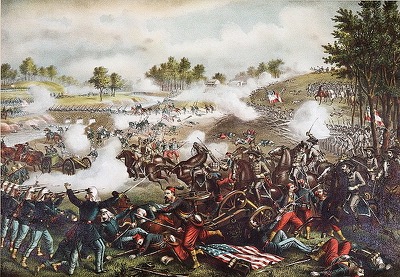LongHaul

First Battle of Bull Run, chromolithograph by Kurz & Allison, 1889
"Heads you win, tails we lose."
Both Union and Confederate soldiers expected the first skirmish of the Civil War to decide the conflict's final outcome. Fine ladies in carriages accompanied troops to the battlefield, expecting a diverting exposition, an amusing afternoon's competition. The Army of the Potomac outnumbered the rebel forces, which were hardly an organized army by then, but were filled with fervor. Neither side imagined the possibility that they might lose. The Union crawled chastised back to Washington that evening, and thus began a long ordeal during which the futility of the rebellion never seemed to settle in. Each side won some and lost some, but each side's dedication rarely wavered. The Confederacy quickly became a brutal autocracy, starving itself in ever-deepening delusion that their dedication might ultimately count for something. They touted Lee as the superior strategist, though he managed to lose every significant conflict. He'd won at Bull Run then went on to narrowly retreat from Antietam and Gettysburg. The terms of engagement seemed to have been set on that midsummer day in Northern Virginia. The manner of engagement largely remained intact throughout. ©2020 by David A. Schmaltz - all rights reserved
Both British and German troops cheered their way to the Marne in 1914, thinking themselves on an organized holiday. Those who returned only came home after surviving an initially unimaginably brutal LongHaul after things got out of hand. Initial engagements seem to amount to so many gnats, easily batted away before more convincingly refusing to go away. Initial strategy might properly prepare for swatting down then inevitably has to adapt for entirely different battlegrounds, when surprisingly one or two down from an initially discounted enemy. The pattern's appeared repeatedly throughout world history, just as if we'll never learn. Our sense of superiority seems to eventually become our greatest enemy, in need of some serious humbling.
This pattern appeared again when encountering This Damned Pandemic. We seemingly automatically underplayed our hand. Had we taken the rumor of contagion seriously, we might have side-stepped a genuine, almost uniquely American tragedy. We're still tussling over a proper response which we seem to reject as an affront to our civil dignity. Humble ourselves before some threatening bug? You've got to be kidding. We're free and brave and not knave to any man or curiously free-floating protein. We'll carry on our usual routine uncowed by any over-blown rumor of threat. We'll just toodle out to Manassas and show them rebels where they can get off threatening us, expecting to be back in time for supper. We must maintain our sacred routine above all else. We'll sacrifice for something worthy of our permanent absence, certainly not this.
Opposition's inevitably insidious. We first fail to grant any potential authority to our enemy, finding our identity strengthened when we derisively characterize them as barely human or a particularly stupid sub-species, certain that THEY don't understand just who they're standing against. Hubris lubricates first contact, probably on both sides. Even our damned COVID-19 virus emerged fully insistent, relying upon a simple set of moves we hadn't seen through quite yet. It seemed absurd that the best initial defense might have actually been to crouch defensively and observe. Where's the glory in that? We could more courageously stand pat and swat at its obvious insignificance. Some suspected our folly, as a minority always seems to. Peace protestors overwhelmed New York in 1861 and London in 1914, both groups discounted as chicken when they accurately foresaw the futility of tooth-and-claw engagement.
Now that we're deeply engaged, we scramble to imagine a LongHaul strategy. Much of the way opening back up, and we encounter what once again seems hardly a hiccup. A few ball players test positive. So what? Isn't that the same So What? we asked the last time and the time before? We're flies in the familiar fly trap. If we could imagine flying down instead of up, we might find the boundaries hardly encumbering. We seem ever insistent upon exclusively flying up, into what we imagine might be a liberating sun. Poor fortune follows us like a stray dog. We seem to have engineered another slog for ourselves, one featuring endless hopeful and desperate attempts to open back up too soon, only to find ourselves rebuffed again and again. Had we more emphatically hunkered, we might have devised means for co-opting this enemy before it serially humiliated us. Knowing only hubris, we continue standing up to declare a birthright stretched beyond its designers' intentions. Heads you win, tails we lose. This just seems to be the way it goes into another curiously unanticipated LongHaul.


